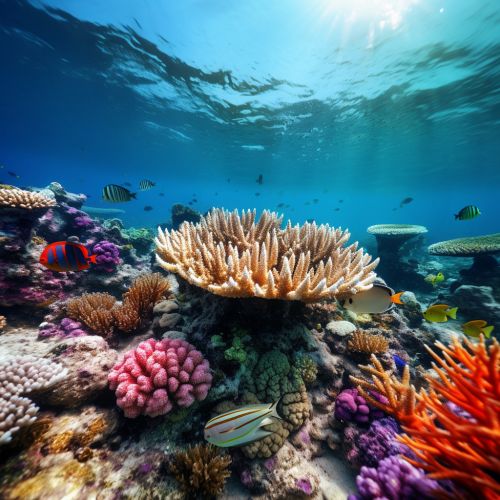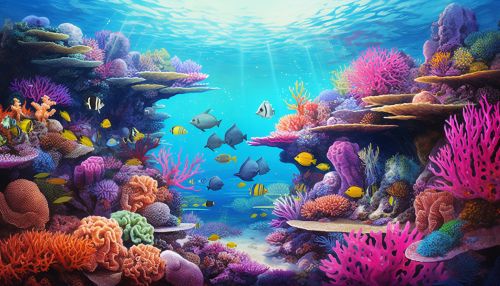The Ecology of Coral Disease and Reef Health
Introduction
Coral reefs are among the most biologically diverse and economically valuable ecosystems on Earth, providing vital ecosystem services such as coastal protection, tourism, and fishing. However, these ecosystems are increasingly threatened by a variety of factors, including climate change, overfishing, and pollution. One of the most significant threats to coral reefs is disease, which can have devastating impacts on reef health and resilience. This article explores the ecology of coral disease and its implications for reef health, drawing on the latest scientific research to provide a comprehensive overview of this important topic.
Coral Reefs and Their Importance
Coral reefs are underwater ecosystems characterized by the presence of coral polyps, which are small, soft-bodied organisms that secrete calcium carbonate to form a hard, protective exoskeleton. These structures, known as coral colonies, provide habitat for a diverse array of marine species, making coral reefs some of the most biodiverse habitats on the planet.
Coral reefs provide a range of important ecosystem services, including coastal protection, tourism, and fishing. They also play a crucial role in the global carbon cycle by absorbing carbon dioxide from the atmosphere and storing it in their calcium carbonate structures. However, these valuable ecosystems are increasingly threatened by a range of factors, including climate change, overfishing, and pollution.
Coral Disease: An Overview
Coral diseases are illnesses that affect coral colonies, often resulting in tissue loss, discoloration, or death. They can be caused by a variety of pathogens, including bacteria, viruses, fungi, and protozoa. Coral diseases can also be caused by non-infectious factors, such as temperature stress, pollution, and physical damage.
Coral diseases can have devastating impacts on reef health and resilience. They can lead to widespread coral mortality, alter community structure, and reduce the ability of reefs to provide important ecosystem services. Understanding the ecology of coral disease is therefore crucial for the conservation and management of coral reefs.
Types of Coral Diseases
There are many different types of coral diseases, each with its own unique set of symptoms, causes, and impacts. Some of the most common and significant coral diseases include:
- Black band disease: This disease is characterized by a dark, migrating band that leaves behind dead coral tissue. It is caused by a complex of cyanobacteria and other microbes, and is often associated with high water temperatures and nutrient enrichment.
- White band disease: This disease causes a white band of dying tissue to progress along the coral colony, often resulting in total colony mortality. The cause of white band disease is still unknown, but it has been linked to high water temperatures and disease outbreaks have been associated with thermal stress events.
- Coral bleaching: Although not a disease per se, coral bleaching is a stress response that can lead to coral mortality. It is caused by the loss of symbiotic algae (zooxanthellae) from the coral tissue, often in response to high water temperatures or other stressors. Bleached corals are more susceptible to disease and other threats.
Factors Influencing Coral Disease
The prevalence and severity of coral diseases are influenced by a range of environmental and biological factors. These include:
- Water temperature: High water temperatures can stress corals and make them more susceptible to disease. Many coral diseases are associated with thermal stress events, such as marine heatwaves.
- Nutrient enrichment: High levels of nutrients, often resulting from human activities such as agriculture and sewage discharge, can promote the growth of pathogens and increase the susceptibility of corals to disease.
- Overfishing: Overfishing can alter reef community structure and increase the prevalence of coral diseases. For example, the removal of herbivorous fish can lead to an increase in macroalgae, which can compete with corals and promote the growth of pathogens.
- Climate change: Climate change is expected to increase the frequency and severity of thermal stress events, leading to more frequent and severe disease outbreaks. It can also alter ocean chemistry, making corals more susceptible to disease.
Impacts of Coral Disease on Reef Health
Coral diseases can have profound impacts on reef health and resilience. They can lead to widespread coral mortality, alter community structure, and reduce the ability of reefs to provide important ecosystem services. Some of the key impacts of coral disease on reef health include:
- Loss of biodiversity: Coral diseases can lead to the loss of coral species and alter the composition of reef communities. This can reduce biodiversity and disrupt the balance of the ecosystem.
- Reduced ecosystem services: Coral diseases can reduce the ability of reefs to provide important ecosystem services, such as coastal protection, tourism, and fishing. This can have significant economic impacts, particularly for communities that rely on coral reefs for their livelihoods.
- Reduced resilience: Coral diseases can reduce the resilience of reefs, making them more susceptible to other threats, such as climate change and overfishing. This can lead to a downward spiral of reef decline.
Management and Conservation
Given the significant impacts of coral diseases on reef health, effective management and conservation strategies are crucial. These include:
- Monitoring and surveillance: Regular monitoring of coral health can help detect disease outbreaks early and inform management responses. This can involve visual surveys, remote sensing, and molecular techniques.
- Reducing stressors: Reducing stressors, such as high water temperatures, nutrient enrichment, and overfishing, can help improve coral health and resilience. This can involve measures such as marine protected areas, fisheries management, and pollution control.
- Restoration and rehabilitation: In areas where coral reefs have been severely affected by disease, restoration and rehabilitation efforts can help promote recovery. This can involve techniques such as coral gardening, where corals are grown in nurseries and then transplanted onto the reef.
See Also


